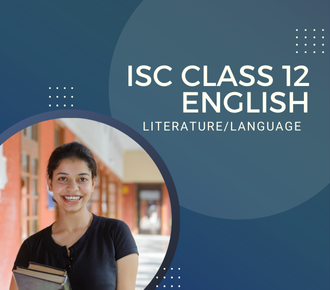- 9:30am - 6:30pm, Mon - Sun
- +91 7836034313
- R2-149 first floor M3M Cosmopolitan, sector 66 Gurugram 122102

Preparing for ISC Class 12 English can feel overwhelming if you don’t have a structured plan. From the vast syllabus to practice papers and identifying weak areas, students often find it challenging to stay organized and exam-focused. This blog is your one-stop solution to mastering ISC Class 12 English with actionable strategies, chapter-wise priorities, important questions from past papers (PYQs), common mistakes to avoid, and a downloadable checklist to track your progress.
Whether you're looking for ISC Class 12 English tips, notes, or an understanding of the ISC Class 12 English syllabus, this guide will ensure you study efficiently and confidently. For additional support, explore our tutoring services at [/tutors], try out our lessons with a [/free-trial], check our [/pricing], or find an expert tutor in your area at [/city/gurugram/home-tutor].
The first step toward exam success is knowing what you need to cover. The ISC Class 12 English syllabus is divided into two parts – Language and Literature. Each component is essential for scoring well, and understanding their structure helps you plan your study sessions effectively.
Precis writing
Comprehension passages
Letter writing (formal & informal)
Report writing
Dialogue and debate writing
Prose: Key essays and chapters from prescribed books
Poetry: Poems with themes, figures of speech, and summary
Drama: Major scenes, characters, and plot analysis
This syllabus breakdown helps you allocate time based on weightage and complexity. The exam emphasizes both writing and comprehension, making it necessary to practice regularly.
Not all chapters hold equal importance in the final exam. Below is a prioritized list based on past years’ papers, recurring themes, and expected patterns.
Prose:
“The Last Lesson” – important for themes like nationalism and loss
“Lost Spring” – socio-economic issues and descriptive writing practice
“The Enemy” – psychological and ethical dilemmas
“Should Wizard Hit Mommy?” – irony and narrative style
Poetry:
“My Mother at Sixty-six” – emotional appeal and imagery
“An Elementary School Classroom in a Slum” – contrast, setting, and symbolism
“A Thing of Beauty” – philosophical themes
“The Rime of the Ancient Mariner” – supernatural elements and moral reflections
Drama:
“The Dear Departed” – satire and character analysis
“Julius Caesar” – themes of betrayal, power, and leadership
“Birth” – maternal bonds and emotion
“Evacuation” – historical and social reflections
“The Last Lesson” – deeper analysis can earn higher marks but isn’t always asked in detail
Poems with metaphorical themes but less frequent in exams
Essays that are rarely covered in exams
Poems where only one or two questions are consistently asked
Extra reading material not explicitly mentioned in the syllabus
Success comes not from studying harder but from studying smarter. Here are the best ISC Class 12 English tips based on what top students do.
Break the syllabus into daily goals
Revise language components every alternate day
Practice writing answers within time limits
Attempt at least 5 years of papers
Analyze which chapters are repeated
Time your practice sessions to simulate real exams
Highlight definitions, themes, and examples
Create short summary sheets for each chapter
Use diagrams or flowcharts for complex concepts
Make flashcards of difficult words from passages and poems
Practice using them in writing answers
Revise them daily
Write clean, structured answers
Stick to the word limit
Use examples and quotes wherever possible
Read passages twice before answering
Underline keywords and phrases
Practice inference-based questions regularly
Not planning answers leads to incomplete responses
Ignoring grammar rules can lose valuable marks
Writing long-winded introductions without answering the question
Overusing quotes without explaining them
Poor handwriting or formatting errors
Practicing PYQs is crucial. Here’s a shortlist of frequently asked questions by section.
Identify the central theme and supporting ideas
Summarize the passage in 100 words
Infer the author's tone and purpose
Summarize arguments on environmental issues, technology, or education
Avoid personal opinions or unnecessary details
Practice writing in formal tone
Applications, complaints, requests, and invitations are common
Focus on format: heading, salutation, body, and closing
Themes, character sketches, and author’s message
Extract-based questions for unseen portions
Explain metaphors, similes, and imagery
Interpret symbols like darkness, sea, light, etc.
Analyze motives of key characters
Describe dramatic techniques like irony, foreshadowing
Awareness of pitfalls helps you avoid them.
Skipping Revision:
Many students only focus on studying but don’t revise. Revision helps with memory consolidation and error correction.
Not Practicing Time Management:
Answer writing takes longer without timed practice. Set strict time goals during practice exams.
Ignoring Grammar and Spelling:
Poor grammar can cost marks even if the content is strong.
Overloading with Notes:
Excessive notes lead to confusion. Keep summaries concise and organized.
Neglecting Past Papers:
Without practicing PYQs, students are unfamiliar with exam patterns and fail to structure answers properly.
Leaving Sections Incomplete:
Answer all sections even if you’re unsure. Attempting is better than leaving questions blank.
Week 1:
Cover all prose chapters with notes
Practice letter writing and precis
Week 2:
Study poetry chapters and revise themes
Attempt 2 past papers focusing on comprehension
Week 3:
Revise drama and practice character sketches
Improve grammar and vocabulary with exercises
Week 4:
Take full-length mock tests
Work on weak areas identified in practice tests
Final Week:
Revise only summary sheets
Solve timed papers every other day
Rest and sleep well before the exam
Use this checklist daily to track your progress.
✅ Reviewed all chapters in prose
✅ Summarized each poem with key themes
✅ Practiced at least 5 comprehension passages
✅ Written 10 precis exercises
✅ Attempted 3 full-length past papers
✅ Practiced grammar and spelling corrections
✅ Prepared answer outlines for common essay topics
✅ Time management drills completed
✅ Notes organized chapter-wise
✅ Sleep and rest scheduled before exams
[Download ISC Class 12 English Checklist PDF]
For students who want guided support, structured lessons, and personalized feedback, our expert tutors are ready to help.
Explore expert tutors at [/tutors]
Try our structured lessons with a [/free-trial]
Review our affordable plans at [/pricing]
Find a tutor near you at [/city/gurugram/home-tutor]
With the right strategy, hard work, and disciplined practice, excelling in ISC Class 12 English is entirely possible. Stick to the syllabus, practice PYQs, use notes wisely, and avoid common mistakes. Stay focused, be consistent, and follow the actionable tips outlined here.
This guide has given you everything — chapter priorities, study plans, exam tips, mistakes to avoid, and a downloadable checklist. Now it’s your turn to apply these strategies and aim for top marks in the exam.
Start today, practice regularly, and success will follow!








